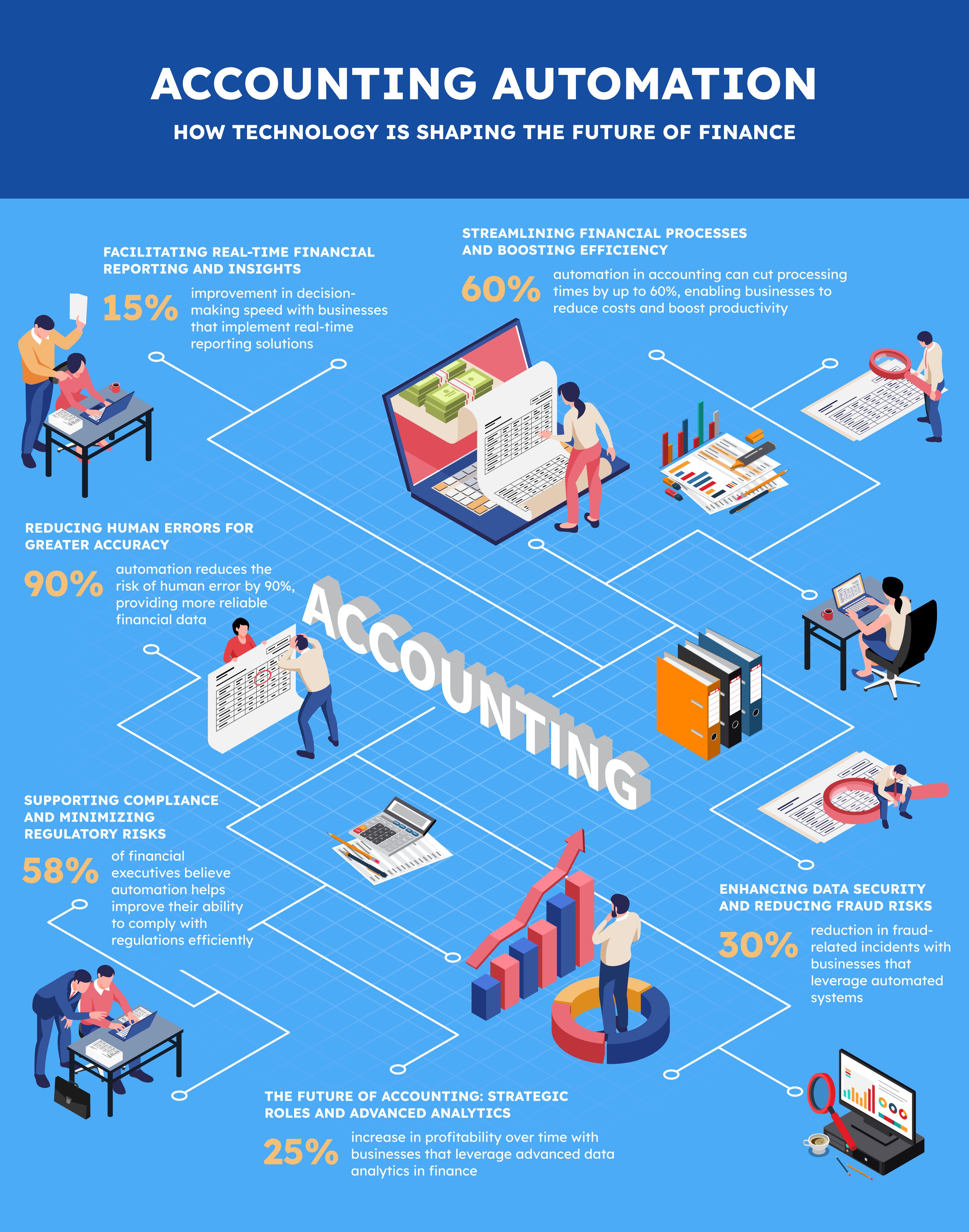The accounting landscape is undergoing a profound transformation, driven by rapid advancements in technology. Automation is reshaping how finance departments operate, enabling businesses to reduce manual workloads, improve decision-making, and boost strategic capabilities. By harnessing automation tools, companies can streamline processes, enhance accuracy, and ensure compliance in a complex financial world. This article explores how automation is revolutionizing accounting and empowering businesses to embrace the future of finance with confidence.


1. Streamlining Financial Processes and Boosting Efficiency
Accounting automation dramatically reduces the time and effort required to complete routine financial tasks. Solutions like robotic process automation (RPA) handle repetitive activities such as data entry, invoice processing, payroll, and reconciliations more efficiently than traditional methods. As a result, finance teams are freed to focus on higher-value activities, such as financial analysis and strategic forecasting.
Why it matters:
According to a report by PwC, automation in accounting can cut processing times by up to 60%, enabling businesses to reduce costs and boost productivity. Finance professionals can use this saved time to enhance strategic decision-making and provide more value to the business.¹
2. Reducing Human Errors for Greater Accuracy
Manual accounting processes are prone to errors, which can lead to significant financial and reputational risks. Automated accounting systems ensure data consistency and accuracy by eliminating the need for manual input. These systems validate data in real-time, flagging discrepancies, and reducing the likelihood of mistakes.
Why it matters:
Research from Accenture indicates that automation reduces the risk of human error by 90%, providing more reliable financial data. With accurate records, businesses can build trust with stakeholders and ensure compliance with financial regulations, making informed decisions based on dependable information.²
3. Supporting Compliance and Minimizing Regulatory Risks
The increasing complexity of global financial regulations poses a challenge for businesses. Automated accounting systems simplify compliance by generating reports, maintaining audit trails, and organizing records according to local and international standards. This reduces the risk of penalties and ensures consistent adherence to evolving regulations.
Why it matters:
A study by Deloitte found that 58% of financial executives believe automation helps improve their ability to comply with regulations efficiently. Automated systems also help companies track regulatory changes, making compliance easier to manage over time.³
4. Enhancing Data Security and Reducing Fraud Risks
Security is a top priority for businesses dealing with sensitive financial information. Accounting automation provides robust security features such as encryption, multi-factor authentication, and role-based access, all designed to safeguard financial data from unauthorized access. Additionally, automation systems can detect irregularities in transactions, alerting businesses to potential fraud risks.
Why it matters:
According to a report by KPMG, businesses that leverage automated systems experience a 30% reduction in fraud-related incidents. By ensuring data security, businesses protect their reputation and foster trust among clients and investors, ultimately gaining a competitive edge in the marketplace.⁴
5. Facilitating Real-Time Financial Reporting and Insights
Traditional accounting methods often involve long reporting cycles, delaying access to up-to-date financial information. Automated accounting systems allow businesses to generate reports in real-time, providing instant access to accurate data for better decision-making. With customizable dashboards, finance teams can track key metrics, detect trends, and assess the organization’s financial health more effectively.
Why it matters:
According to a survey by Gartner, businesses that implement real-time reporting solutions experience a 15% improvement in decision-making speed. Instant access to financial insights enables companies to respond swiftly to market changes, fostering greater agility and collaboration across departments.⁵
6. Building a Future-Ready Finance Function with Xerosoft Global
Xerosoft Global helps businesses harness the power of automation to modernize their financial processes and achieve long-term success. Our services include:
- Automated Financial Reporting: We provide real-time reporting solutions, giving businesses immediate access to the latest data, enabling faster, more informed decisions.
- Compliance and Regulatory Solutions: Our automated solutions ensure businesses meet regulatory requirements with ease, avoiding costly penalties.
- Security-Focused Automation: We offer advanced security protocols that protect sensitive financial data from unauthorized access.
- Tailored Automation Consulting: Our experts work with businesses to develop customized accounting automation strategies, optimizing efficiency and streamlining processes.
7. The Future of Accounting: Strategic Roles and Advanced Analytics
As automation increasingly handles routine tasks, finance professionals are evolving into strategic advisors within their organizations. With data entry and processing automated, finance teams can shift focus to analyzing financial data, identifying trends, and supporting executive decision-making. The integration of advanced analytics further empowers finance professionals, enabling them to forecast potential outcomes and optimize business performance.
Why it matters:
McKinsey reports that businesses that leverage advanced data analytics in finance see a 25% increase in profitability over time. As automation takes over transactional tasks, finance departments become proactive partners in driving growth and success, helping businesses navigate complex financial landscapes.⁶

Conclusion
Accounting automation is transforming the finance function, bringing unprecedented accuracy, efficiency, and security to financial operations. By reducing manual tasks, enhancing real-time reporting, and enabling strategic decision-making, automation helps companies minimize risks and focus on growth. With the expertise of Xerosoft Global, businesses can seamlessly integrate automation into their operations, transforming their finance departments into agile, future-ready teams.
References:
- PwC. (2022). “The Future of Finance: Embracing Automation.” PwC.
- Accenture. (2023). “Driving Accuracy in Financial Processes through Automation.” Accenture.
- Deloitte. (2023). “How Financial Executives are Improving Compliance Through Automation.” Deloitte.
- KPMG. (2023). “Cybersecurity in Accounting: Leveraging Automation to Combat Fraud.” KPMG.
- Gartner. (2022). “The Role of Real-Time Financial Reporting in Business Agility.” Gartner.
- McKinsey. (2023). “Advanced Analytics and Automation: The Path to Greater Profitability.” McKinsey.

